Sealaska Heritage Institute (SHI) has enlisted renowned, nationally-known educators to give keynote addresses at its third education conference for teachers and administrators in Southeast Alaska, which is part of a larger effort to promote culturally responsive pedagogy in schools.
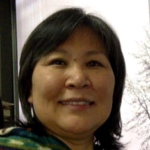 Panigkaq Agatha John-Shields, Ph.D., is the daughter of the late Dr. Chief Kangrilnguq Paul and Anguyaluk Martina John of Toksook Bay, Alaska, where she was raised in a traditional and cultural community by many elder mentors. Agatha was a Yup’ik teacher and a principal for Lower Kuskokwim School District for 17 years at Ayaprun Elitnaurvik Yup’ik Immersion Charter School in Bethel, Alaska. She currently is an assistant professor at the University of Alaska Anchorage for the Educational Leadership and Language Program for the School of Education. Her professional passion is to teach through the lens of personal stories and experiences integrating Indigenous education and culturally-responsive teaching and learning focusing on cultural proficiency. She has also taught at cultural camps transitioning new teachers to Alaska before they move to the villages in the Calista region. She is a guest speaker and lecturer at teacher and principal in-service training in various school districts in the state. Panigkaq Agatha John-Shields, Ph.D., is the daughter of the late Dr. Chief Kangrilnguq Paul and Anguyaluk Martina John of Toksook Bay, Alaska, where she was raised in a traditional and cultural community by many elder mentors. Agatha was a Yup’ik teacher and a principal for Lower Kuskokwim School District for 17 years at Ayaprun Elitnaurvik Yup’ik Immersion Charter School in Bethel, Alaska. She currently is an assistant professor at the University of Alaska Anchorage for the Educational Leadership and Language Program for the School of Education. Her professional passion is to teach through the lens of personal stories and experiences integrating Indigenous education and culturally-responsive teaching and learning focusing on cultural proficiency. She has also taught at cultural camps transitioning new teachers to Alaska before they move to the villages in the Calista region. She is a guest speaker and lecturer at teacher and principal in-service training in various school districts in the state. |
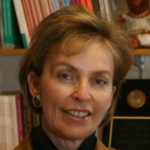 Teresa L. McCarty is an educational anthropologist and applied linguist who has worked in the field of Indigenous education for more than 30 years. She is currently the George F. Kneller Chair in Education and Anthropology and faculty in American Indian Studies at the University of California, Los Angeles. She began her work as a youth counselor for the Fort McDowell Yavapai Nation and subsequently worked as a bilingual-bicultural curriculum developer on the Navajo Nation. As a faculty member at the University of Arizona, she co-directed the American Indian Language Development Institute, an international program for teachers, school administrators, Native community members, and university students in Indigenous language-and culture-based education and American Indian linguistics. A member of the National Academy of Education and a Fellow of the American Educational Research Association and the International Centre for Language Revitalization, she is the former editor of the American Educational Research Journal and the current coeditor of the Journal of American Indian Education. Her books include A Place To Be Navajo—Rough Rock and the Struggle for Self-Determination in Indigenous Schooling, “To Remain an Indian”—Lessons in Democracy from a Century of Native American Education (with K.T. Lomawaima), Language Planning and Policy in Native America, Indigenous Youth and Multilingualism (with L.T. Wyman and S.E. Nicholas), Indigenous Language Revitalization in the Americas (with S.M. Coronel-Molina), and A World of Indigenous Languages: Politics, Pedagogies, and Prospects for Language Reclamation (with S.E. Nicholas and G. Wigglesworth). She is currently leading a national study of Indigenous-language immersion schooling funded by the Spencer Foundation. Teresa L. McCarty is an educational anthropologist and applied linguist who has worked in the field of Indigenous education for more than 30 years. She is currently the George F. Kneller Chair in Education and Anthropology and faculty in American Indian Studies at the University of California, Los Angeles. She began her work as a youth counselor for the Fort McDowell Yavapai Nation and subsequently worked as a bilingual-bicultural curriculum developer on the Navajo Nation. As a faculty member at the University of Arizona, she co-directed the American Indian Language Development Institute, an international program for teachers, school administrators, Native community members, and university students in Indigenous language-and culture-based education and American Indian linguistics. A member of the National Academy of Education and a Fellow of the American Educational Research Association and the International Centre for Language Revitalization, she is the former editor of the American Educational Research Journal and the current coeditor of the Journal of American Indian Education. Her books include A Place To Be Navajo—Rough Rock and the Struggle for Self-Determination in Indigenous Schooling, “To Remain an Indian”—Lessons in Democracy from a Century of Native American Education (with K.T. Lomawaima), Language Planning and Policy in Native America, Indigenous Youth and Multilingualism (with L.T. Wyman and S.E. Nicholas), Indigenous Language Revitalization in the Americas (with S.M. Coronel-Molina), and A World of Indigenous Languages: Politics, Pedagogies, and Prospects for Language Reclamation (with S.E. Nicholas and G. Wigglesworth). She is currently leading a national study of Indigenous-language immersion schooling funded by the Spencer Foundation. |
|
|
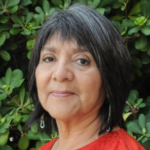 Sheilah Nicholas—In her ancestral and home community of Hopi in the Black Mesa region of the U.S. Southwest (northeastern Arizona), she is Qötsahonmana, White Bear Girl, Sunforehead Clan from Songoopavi, her maternal village. Her birth parents are Muuyi, Ann Joseph, Sunforehead Clan and Ahöla, Ernest Joseph, Bear Strap Clan. She was raised from birth by her maternal aunt, Piqöshaynöm, Laura Nasetoynewa, Eagle Clan and her husband, Milton Nicholas, Coyote Clan; they too, are her parents. This foundation provides her grounding in the Hopi ethics of respect, responsibility, and accountability and guides her aspirations to research ancestral knowledge respectfully, to reclaim Indigenous ways of knowing, and to validate and advance Indigenous knowledge systems as important contributions to scholarship and the academy. In the Western world and academia, she is Sheilah E. Nicholas, professor in the Department of Teaching, Learning, and Sociocultural Studies at the University of Arizona and faculty instructor for the American Indian Language Development Institute. Her focus areas of instruction are research methodology, multicultural education, Indigenous education, Indigenous language and culture in the classroom, teaching responsibly—teaching with responsibility, and Indigenous oral immersion language teaching. Her research focus is the role of Indigenous languages and knowledge in the academic, familial, community, and cultural identities of Indigenous youth, and ways in which Indigenous educators mediate those processes. Sheilah Nicholas—In her ancestral and home community of Hopi in the Black Mesa region of the U.S. Southwest (northeastern Arizona), she is Qötsahonmana, White Bear Girl, Sunforehead Clan from Songoopavi, her maternal village. Her birth parents are Muuyi, Ann Joseph, Sunforehead Clan and Ahöla, Ernest Joseph, Bear Strap Clan. She was raised from birth by her maternal aunt, Piqöshaynöm, Laura Nasetoynewa, Eagle Clan and her husband, Milton Nicholas, Coyote Clan; they too, are her parents. This foundation provides her grounding in the Hopi ethics of respect, responsibility, and accountability and guides her aspirations to research ancestral knowledge respectfully, to reclaim Indigenous ways of knowing, and to validate and advance Indigenous knowledge systems as important contributions to scholarship and the academy. In the Western world and academia, she is Sheilah E. Nicholas, professor in the Department of Teaching, Learning, and Sociocultural Studies at the University of Arizona and faculty instructor for the American Indian Language Development Institute. Her focus areas of instruction are research methodology, multicultural education, Indigenous education, Indigenous language and culture in the classroom, teaching responsibly—teaching with responsibility, and Indigenous oral immersion language teaching. Her research focus is the role of Indigenous languages and knowledge in the academic, familial, community, and cultural identities of Indigenous youth, and ways in which Indigenous educators mediate those processes. |
|
|

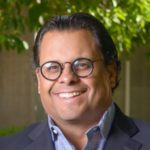 Bryan McKinley Jones Brayboy (Lumbee) is president’s professor in the School of Social Transformation at Arizona State University (ASU). At ASU, he is senior advisor to the president and director of the Center for Indian Education. He is the author/editor of nine volumes, dozens of articles and book chapters, and multiple policy briefs for the U.S. Department of Education, National Science Foundation, and the National Academy of Sciences. His research focuses on the role of race and diversity in higher education, and the experiences of Indigenous students, staff, and faculty in institutions of higher education. He has been a visiting and noted scholar in Canada, Australia, New Zealand, and Norway. He and his team have, over the past 19 years, prepared more than 160 Native teachers to work in American Indian communities and 19 American Indian PhDs. He is a fellow of the American Educational Research Association and a member of the National Academy of Education.
Bryan McKinley Jones Brayboy (Lumbee) is president’s professor in the School of Social Transformation at Arizona State University (ASU). At ASU, he is senior advisor to the president and director of the Center for Indian Education. He is the author/editor of nine volumes, dozens of articles and book chapters, and multiple policy briefs for the U.S. Department of Education, National Science Foundation, and the National Academy of Sciences. His research focuses on the role of race and diversity in higher education, and the experiences of Indigenous students, staff, and faculty in institutions of higher education. He has been a visiting and noted scholar in Canada, Australia, New Zealand, and Norway. He and his team have, over the past 19 years, prepared more than 160 Native teachers to work in American Indian communities and 19 American Indian PhDs. He is a fellow of the American Educational Research Association and a member of the National Academy of Education.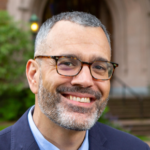 Django Paris is a Black educator and scholar born on Ohlone homelands in San Francisco, California, to a White mother and a Black Jamaican father. Paris is honored to be the inaugural James A. and Cherry A. Banks professor of multicultural education and director of the Banks Center for Educational Justice at the University of Washington. His teaching and research focus on sustaining languages, literacies, and lifeways among Indigenous, Black, Latinx, Asian and Pacific Islander students in the context of ongoing resurgence, decolonization, liberation, and justice movements in and beyond schools. He is particularly concerned with educational and cultural justice as outcomes of inquiry and pedagogy. Paris is author of
Django Paris is a Black educator and scholar born on Ohlone homelands in San Francisco, California, to a White mother and a Black Jamaican father. Paris is honored to be the inaugural James A. and Cherry A. Banks professor of multicultural education and director of the Banks Center for Educational Justice at the University of Washington. His teaching and research focus on sustaining languages, literacies, and lifeways among Indigenous, Black, Latinx, Asian and Pacific Islander students in the context of ongoing resurgence, decolonization, liberation, and justice movements in and beyond schools. He is particularly concerned with educational and cultural justice as outcomes of inquiry and pedagogy. Paris is author of